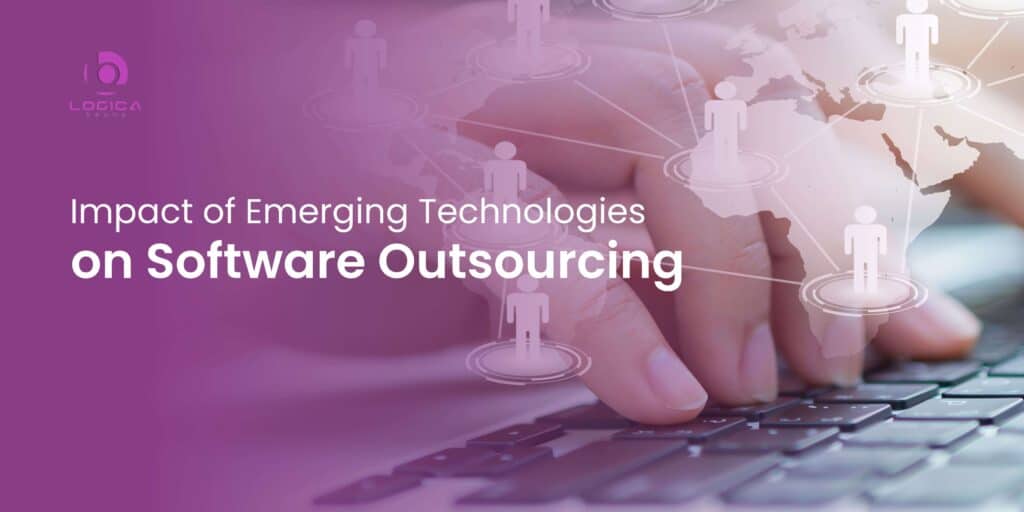Emerging technologies, such as artificial intelligence, machine learning, and the internet of things, are having a significant impact on the software outsourcing industry. These technologies are enabling companies to automate many tasks and processes, streamline their operations, and improve the efficiency and accuracy of their work. This is making it possible for companies to outsource more complex software development projects, and to reduce the time and cost associated with these projects. There are many different types of emerging technologies that are having an impact on the software outsourcing industry.
7 Emerging Technologies in Software Outsourcing:
Artificial Intelligence (AI) and Machine Learning (ML)
These technologies enable computers to learn from data, and to perform tasks that would normally require human intelligence, such as recognizing patterns, making predictions, and taking decisions. AI and ML are being used in a wide range of applications, including natural language processing, image and video analysis, and predictive analytics.
AI and ML could also be used to create new business models for software outsourcing, such as on-demand services that use AI and ML to automatically generate code or perform other tasks. This could potentially make it easier for companies to outsource software development, as it would enable them to access a global pool of talent and resources in real time. While the use of AI and ML in software outsourcing is still in its early stages, these technologies have the potential to significantly improve the efficiency and effectiveness of the software development process, and could ultimately benefit both companies and developers.
Internet of Things (IoT)
This refers to the growing network of connected devices, sensors, and systems that are able to collect, transmit, and analyze data in real time. The IoT is enabling companies to automate and optimize many business processes, and to create new products and services that are more personalized, responsive, and convenient.
In software outsourcing, the IoT could potentially be used to enable new forms of collaboration and data sharing among remote teams. For example, developers working on an IoT project for a client could use sensors and other IoT devices to collect real-time data from the client’s physical environment, which could then be used to develop and test the software. This could potentially make it easier for companies to outsource software development for IoT projects, as it would enable them to access real-time data from the client’s environment without having to be physically present.
Cloud Computing and Virtualization
These technologies enable companies to access and use computing resources, such as storage, networking, and software, on demand, and without the need for expensive hardware and infrastructure. Cloud computing and virtualization are making it easier for companies to outsource software development projects, and to access specialized tools and expertise.
Blockchain
This is a decentralized, distributed ledger technology that enables secure, transparent, and immutable record-keeping. Blockchain is being used in a wide range of applications, including cryptocurrency, supply chain management, and identity verification. This can be useful for software outsourcing in areas such as blockchain application development and management.
In software outsourcing, blockchain could potentially be used to create secure, decentralized platforms for collaboration and data sharing. This could make it easier for companies to outsource software development, as it would enable them to securely share data and collaborate with remote teams in real time.
This could make it easier for companies to find and hire talented software developers from around the world, and could also help developers connect with potential clients and earn a fair price for their work. Currently, while the use of blockchain in software outsourcing is still in its early stages, it has the potential to enable new forms of collaboration and value exchange that could benefit both companies and developers.
5G and Edge Computing
These technologies are enabling faster, more reliable, and more secure connectivity, and are making it possible for companies to process and analyze data closer to the source. 5G and edge computing are enabling new applications and services, such as augmented and virtual reality, and are making it possible for companies to outsource more complex software development projects. Edge computing, on the other hand, involves performing computing tasks closer to the edge of the network, rather than in a centralized data center. This can help reduce latency and improve the performance of applications that require real-time data processing, such as augmented reality and the internet of things.
Together, 5G and edge computing are expected to enable new forms of software outsourcing, such as remote collaboration and real-time remote access to computing resources. This could potentially make it easier for companies to outsource software development, as it will enable them to access a global pool of talent and resources in real time.
Impacts of Emerging Technologies in Software Outsourcing
These are just a few examples of the many different types of emerging technologies that are having an impact on the software outsourcing industry. There are many other technologies that are also playing a significant role, such as robotics, biometrics, and quantum computing.
Business Optimization
Emerging technologies are making it possible for companies to automate and optimize many business processes, and to reduce the time and cost associated with software development projects. For example, AI and ML can be used to automate tasks such as coding, testing, and debugging, and to improve the accuracy and efficiency of these processes. This is making it possible for companies to outsource more complex software development projects, and to deliver better software faster and more affordably.
Development Process
Emerging technologies are also changing the way that software is developed and delivered. For example, the rise of open-source software and platforms, such as Linux and GitHub, are making it easier for companies to collaborate on software development projects, and to share and reuse code and tools. This is leading to the emergence of new business models, such as the “freemium” model, where software is offered for free, but users can pay for additional features and services.
Innovation
Emerging technologies are also driving innovation and disruption in the software outsourcing industry. For example, the rise of the gig economy, and the growth of platforms such as Upwork and Fiverr, are making it easier for companies to access and hire freelance software developers, and to collaborate on software development projects. This is leading to the emergence of new ways of working, and new business models, such as the “open innovation” model, where companies can leverage the collective intelligence and creativity of a global community of software developers.
Development and Operations
Emerging technologies like cloud computing are changing the way that software is developed and delivered. For example, cloud computing and virtualization are making it easier for companies to access and use specialized software tools and platforms, without having to invest in expensive hardware and infrastructure. This is making it easier for companies to outsource software development projects, and to access a global pool of talent and expertise.
The impact of emerging technologies on software outsourcing is significant and multifaceted. These technologies are enabling companies to automate and streamline their operations, to access specialized tools and expertise, and to innovate and disrupt traditional business models. This is making it possible for companies to outsource more complex software development projects, and to deliver better software faster and more affordably.
Conclusion
These emerging technologies could enable new forms of collaboration and value exchange in software outsourcing, and could help make it easier for companies to access global talent and resources. Overall, the integration of these technologies into the field of software outsourcing has the potential to benefit both companies and developers.










